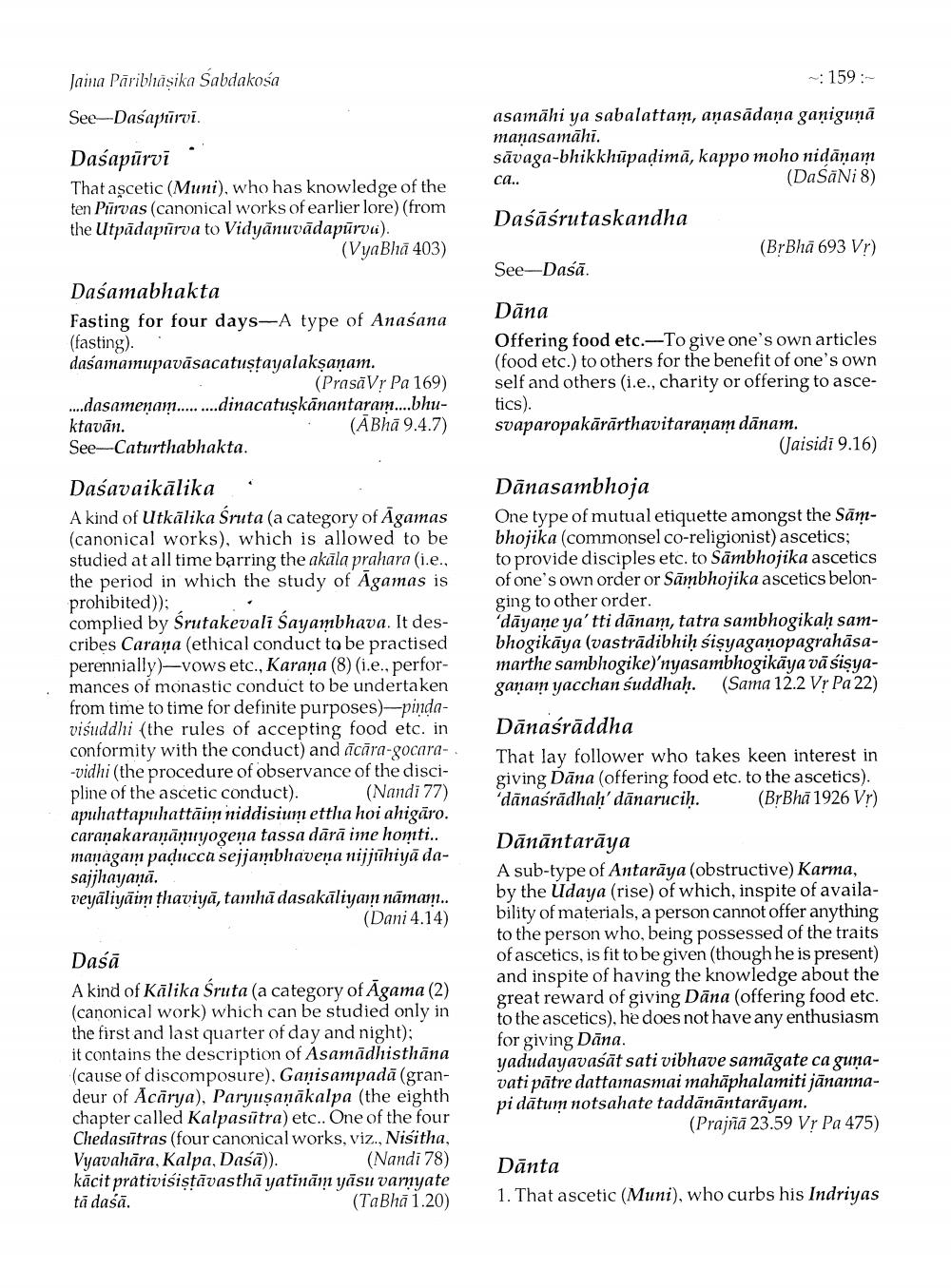________________
Jaina Pāriblasika Sabdakosa
- 159:
See-Dasapurvi.
asamähi ya sabalattam, anasādana ganiguņā manasamāhi. sāvaga-bhikkhūpadimā, kappo moho nidānam ca..
(DasăNi 8)
Dasapūrvi That ascetic (Muni), who has knowledge of the ten Purvas (canonical works of earlier lore) (from the Utpădapurva to Vidyānuvādapūrva).
(VyaBhā 403)
Daśāśrutaskandha
(BrBhā 693 Vr)
See-Dasā.
Daśamabhakta Fasting for four days-A type of Anasana (fasting). dasamamupavāsacatuştayalakṣaṇam.
(PrasãVr Pa 169) ....dasamenam.........dinacatuṣkānantaram....bhuktavān.
(ABhā 9.4.7) See-Caturthabhakta.
Dāna Offering food etc.-To give one's own articles (food etc.) to others for the benefit of one's own self and others (i.e., charity or offering to ascetics) svaparopakārārthavitaranam dānam.
(Jaisidi 9.16)
Dānasambhoja One type of mutual etiquette amongst the Sāmbhojika (commonsel co-religionist) ascetics; to provide disciples etc. to Sāmbhojika ascetics of one's own order or Sambhojika ascetics belonging to other order. 'dāyaṇe ya'tti dānam, tatra sambhogikaḥ sambhogikāya (vastrādibhiḥ śişyagaṇopagrahāsamarthe sambhogike)'nyasambhogikäya vā sisyaganam yacchan suddhaḥ. (Sama 12.2 V? Pa 22)
Daśavaikālika : A kind of Utkālika Śruta (a category of Agamas (canonical works), which is allowed to be studied at all time barring the akāla prahara (i.e., the period in which the study of Agamas is prohibited)); complied by Srutakevali Sayambhava. It describes Carana (ethical conduct to be practised perennially)-vows etc., Karaņa (8) (i.e., performances of monastic conduct to be undertaken from time to time for definite purposes)-pindavisuddhi (the rules of accepting food etc. in conformity with the conduct) and ācāra-gocara-vidhi (the procedure of observance of the discipline of the ascetic conduct). (Nandi 77) apuhattapuhattāim niddisiuni ettha hoi ahigāro. caramakaraṇānuyogeņa tassa dārā ime homti.. managam paducca sejjambhavena nijjiīhiyā dasajjhayaņā. veyāliyāim thaviyā, tamhā dasakāliyam nāmam..
(Dani 4.14)
Dānasrāddha That lay follower who takes keen interest in giving Dāna (offering food etc. to the ascetics). 'dānasrādhah' dānarucih. (BrBhā 1926 Vr)
Daśā A kind of Kālika Śruta (a category of Āgama (2) (canonical work) which can be studied only in the first and last quarter of day and night); it contains the description of Asamādhisthāna (cause of discomposure), Ganisampadā (grandeur of Acarya), Paryusaņākalpa (the eighth chapter called Kalpasutra) etc.. One of the four Chedasūtras (four canonical works, viz., Nisitha, Vyavahāra, Kalpa, Dasā)).
(Nandi 78) kācit prativisistāvasthā yatinām yāsu varnyate tā dasā.
(TaBhā 1.20)
Dānāntarāya A sub-type of Antarāya (obstructive) Karma, by the Udaya (rise) of which, inspite of availability of materials, a person cannot offer anything to the person who, being possessed of the traits of ascetics, is fit to be given though he is present) and inspite of having the knowledge about the great reward of giving Dāna (offering food etc. to the ascetics), he does not have any enthusiasm for giving Dāna. yadudayavaśāt sati vibhave samāgate ca gunavati pätre dattamasmai mahäphalamiti jānannapi dātumnotsahate taddānāntarāyam.
(Prajna 23.59 Vy Pa 475)
Dānta 1. That ascetic (Muni), who curbs his Indriyas




